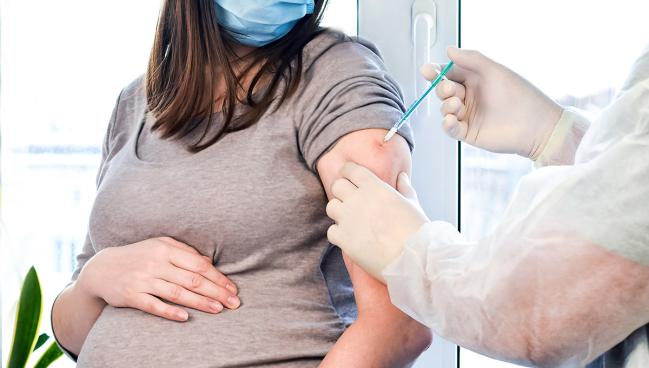‘Stunning’ Lack of Data on CV Issues in Pregnant Women With COVID-19
Small case series and sharing of experience are guiding some of the decision-making in this understudied population.

Pregnant women with COVID-19 are at increased risk of severe disease, ICU stays, and adverse pregnancy and child-health outcomes, with the greatest risks in the unvaccinated population, a new state-of-the-art review suggests. Furthermore, while CV complications and their management have been reported, the data lag far behind that of the overall population.
“Pregnant women aren't well studied in general,” Joan E. Briller, MD (University of Illinois at Chicago), told TCTMD. That’s why the review was necessary: when it comes to knowledge about CV issues in pregnant women with COVID-19, she added, “the lack of information, to me, is stunning.”
In the review, published today in JACC: Advances, Briller and colleagues say it can be difficult to distinguish unique pregnancy complications such as preeclampsia, peripartum cardiomyopathy, and spontaneous coronary artery dissection (SCAD) from COVID-19-associated cardiac complications and long-haul symptoms. With regard to the latter, the outlook for women of reproductive age with long-haul COVID, including their risk of CV complications with subsequent pregnancies, is important but largely unknown at present, the review notes.
“If we don't study women who are pregnant, we have two potential things that can turn out badly. One is we may treat them without knowing whether or not what we're doing is beneficial, but also we may not treat them as appropriately as we should,” Briller said. “[Clinicians] sometimes can be so scared that they may hurt the baby that they're not willing to give appropriate care to the mother, and yet you need a live mom if you're going to have the baby.”
What the (Sparse) Data Show
Briller and colleagues note that a living systematic review of more than 60,000 pregnant or recently pregnant women suggests that those with versus without COVID infection are more likely to have preterm births (OR 1.47; 95% CI 1.14-1.91) and stillbirths (OR 2.84; 95% CI 1.25-6.45), with 25% of babies delivered alive ending up in neonatal ICU. Similarly, data from the US Centers for Disease Control and Prevention (CDC) show increased risks of ICU admission, mechanical ventilation, extracorporeal membrane oxygenation (ECMO), and death for pregnant versus nonpregnant women with COVID.
Preexisting CVD further increases the likelihood of ICU admission, mechanical ventilation, or death compared with women with no comorbidities. Breakdowns by racial and ethnic groups found that even though they represented less than 15% of pregnant women with COVID studied, non-Hispanic Black women accounted for 26.5% of pregnancy-related deaths. Hispanic women also were at increased risk of death, while Asian and Native Hawaiian/Pacific Islanders were among those at the highest risks of ICU admission.
Another study of 131,751 women who were pregnant in Scotland in 2021 found that the rate of full vaccination was just 32%, and that hospital admission and need for critical care were increasingly frequent as pregnancy progressed, peaking in the third trimester. Nearly 80% of those requiring hospital admission, 98% of those needing critical care, and all fetal deaths occurred in the unvaccinated group.
[Clinicians] sometimes can be so scared that they may hurt the baby that they're not willing to give appropriate care to the mother, and yet you need a live mom if you're going to have the baby. Joan Briller
Other data have come from small case series, including one of 15 pregnant women from the Dominican Republic who were admitted with COVID-19 infection and had biomarker testing for suspected myocardial injury. Approximately 10% had high troponin (Tn), with median levels of 34.6 ng/mL. Most of the study participants had left ventricular dysfunction, with a mean ejection fraction of 37.67%, and elevated pro-B-type natriuretic peptide levels, with a mean of 209 pg/mL. In this study, 13% of the women died.
Briller and colleagues say the same steps taken to diagnose suspected myocardial injury in nonpregnant patients should be taken in those with pregnancy and COVID, noting that most CV testing can be performed safely. With regard to radiation exposure, they advise treatment should not be delayed out of concerns for exposure to the fetus, adding that addressing concerns that pregnant patients may have “can be an essential part of the decision process.”
Another potential concern for pregnant women with COVID is heart failure (HF), which while rare, has been shown to occur without any previous underlying disease or risk factors in a small subset of patients in the general population. Since some symptoms of HF, like dyspnea, can mimic those of normal pregnancy, Briller and colleagues say pregnant women with COVID and moderate-to-severe illness, or with evidence of myocardial injury, should be evaluated carefully for new-onset HF and/or cardiomyopathy.
Addressing Gaps
To TCTMD, Briller said it’s not unusual for clinicians treating pregnant women with COVID to sometimes feeling like they are “flying blind” when making management decisions, reinforcing the importance of documenting and sharing outcomes and strategies. She related one case where ECMO was being considered in a severely ill pregnant woman with COVID.
“Ultimately, the decision was made that she was far enough along in the pregnancy that we should just deliver the baby, and she improved after the delivery,” Briller noted. “Having data out there, even in terms of a case series, [can] give you a better idea of where you should go from here.”
The review also touches on the importance of a “pregnancy heart team” to manage cardiac complications, noting that these might be comprised of “providers comfortable with high-risk pregnancy, obstetric anesthesia, cardiology, critical care, and neonatal care, depending on the nature of the complication, stage of pregnancy, and severity of disease.” Briller said others such as pulmonologists and surgeons also might be needed.
“The concept of having a multidisciplinary approach has really come to the forefront in the last 4 to 5 years. As more people have come to recognize that cardiac disease is a major contributor to maternal morbidity and mortality, you've seen a greater interest in people participating in these teams or forming them,” Briller said. “COVID has fueled that somewhat, but it really started prior to COVID.”
Looking at additional gaps in knowledge, the review paper notes that the “vast majority of COVID-19 trials testing new or repurposed medications have excluded pregnant participants despite several calls for their inclusion.” This exclusion of a population of patients who are already at risk and undervaccinated, Briller and colleagues add, could contribute to even greater vaccine hesitancy.
They further conclude that cardiology providers should talk to their patients about the safety of COVID-19 vaccines in keeping with recommendations from the CDC, American College of Obstetrics and Gynecology, and the Society of Maternal Fetal Medicine, all of whom maintain that vaccination in pregnancy is safe and efficacious.
L.A. McKeown is a Senior Medical Journalist for TCTMD, the Section Editor of CV Team Forum, and Senior Medical…
Read Full BioSources
Briller JE, Aggarwal NR, Davis MB, et al. Cardiovascular complications of pregnancy-associated COVID-19 infections. JACC: Advances. 2022;Epub ahead of print.
Disclosures
- Briller reports no relevant conflicts of interest.





Comments